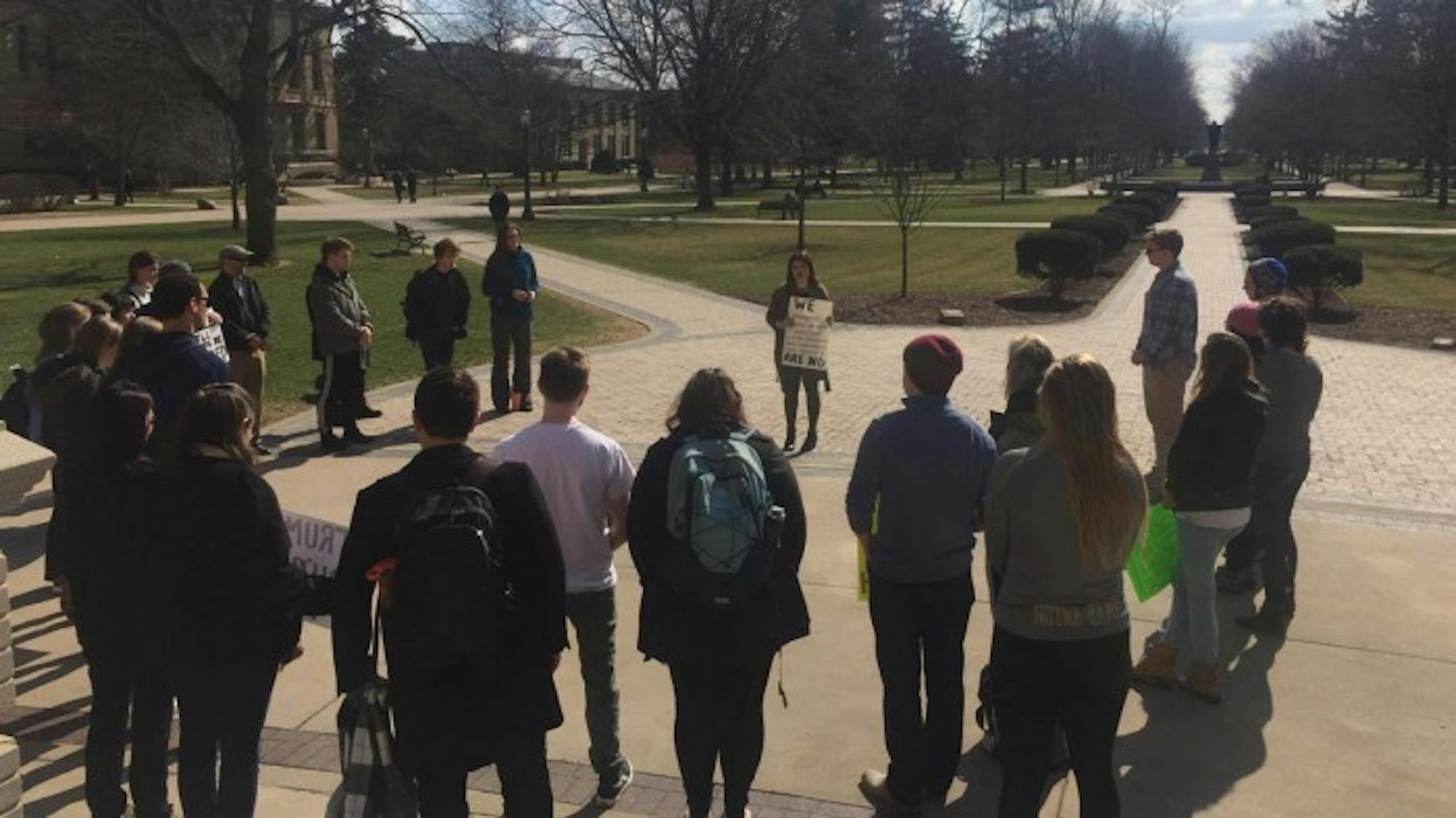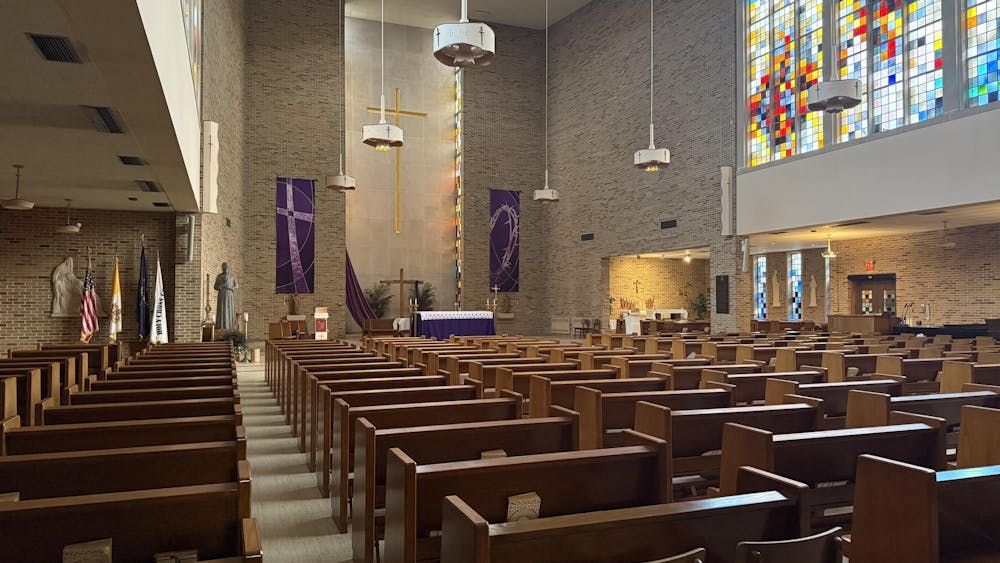About 30 people gathered outside Main Building on Monday to demonstrate against the University’s potential invitation of President Donald Trump to speak at the class of 2017’s Commencement ceremony, citing his hateful rhetoric and discrimination against minorities and marginalized groups.
College Democrats, Diversity Council and We Stand For organized the demonstration in order to “protest the possibility of President Donald Trump speaking at Notre Dame’s Commencement this year” and ask University President Fr. John Jenkins to “rescind the invitation he made to then-candidate Trump, and invite a different Commencement speaker,” according to the Facebook event page.
The University has not made an official announcement on whether it has invited Trump to speak at Commencement. Vice president for public affairs and communications Paul Browne said the University invited all primary presidential candidates, including both Trump and Hillary Clinton, to campus last year to speak at an envisioned series on foreign policy. None of the candidates accepted, and a separate invitation would have to be issued to Trump to speak at Commencement.
In an interview with The Observer in December 2016, Jenkins said he had not decided whether to invite Trump to be the Commencement speaker. In response to a question at a town hall meeting on athletics about whether he knew who the Commencement speaker would be, Jenkins responded in the negative.
College Democrats co-president Andrew Galo said Monday’s demonstration was a follow-up to a petition written by members of College Democrats and the Diversity Council, also in December, which asked Jenkins not to invite Trump to speak at Commencement. The petition garnered more than 3,000 signatures. Galo said Jenkins’ office had not responded to the petition.
“In the short term, we’d like to have some clarity in terms of where Fr. Jenkins is at in terms of his thought process and decision-making process, but really this is about making sure we don’t have President Trump as our Commencement speaker and that we really do honor our graduates and we honor our values,” he said.
During the demonstration, Galo urged Jenkins to make “a principled choice, a moral choice” not to invite Trump to Commencement.
“We know that Commencement is a special time for all students and for all graduating seniors,” he said. “I myself am a graduating senior, and ... we’ve worked way too hard for this to be the final event for our time here at Notre Dame.”
Diversity Council co-chair Mylan Jefferson said the group is against inviting Trump to Commencement because his words and actions are not inclusive, which goes against the mission of the group.
“2017 graduates ... they shouldn’t have to worry about their safety on campus or feeling like they need to protect themselves from any of the hateful words or actions that may be taken against them, so we strongly urge ... Jenkins to rescind the invitation to Donald Trump, because this is a time for us to celebrate,” she said.
Senior Xitlaly Estrada told the story of her parents, who came to the United States from Mexico as young adults and “built an empire, and this empire was not determined by monetary things that they owned but rather the education that they have offered us throughout the years.”
Estrada said Commencement was supposed to be about her family, as well as the families of students who are black, LGBT, transgender or Muslim — all of whom she said were discriminated against under the Trump administration.
“This is for all of them,” she said. “So I cannot stand idly by as I watch this University attempt to invite this hateful, bigoted man. I cannot.”
English and Africana Studies associate professor Stuart Greene said while Trump should be listened to and public discourse should be civil, Trump contradicts the values of the University as a place of respecting human dignity. Greene said he was particularly concerned by Trump’s “silence, his lack of action in addressing the enormous rise in hate crimes across the U.S., [and] his silence, until recently, about Jews in this country who are the victims of a Holocaust that this administration failed to even recognize.”
“To be silent amid all the violence sends a very powerful message to those who don’t embrace the dignity of all individuals that it’s okay to persecute, that it’s okay to be violent, and I cannot in good conscience embrace ... the very idea that we should invite someone that contradicts the very mission of Notre Dame,” Greene said.
Carolina Arroyo, associate professional specialist of political science and adviser of the College Democrats, said Trump is responsible for inciting violence, such as the recent shooting of two Indian men in Kansas which left one man dead and is currently being investigated as a hate crime.
“Someone that is on our email list ... made a very good point that if we had a student here that said those kinds of things or took those kinds of actions, that student, number one, would not be accepted, and/or if that person came to the University, would be expelled,” she said. “So how can we accept a person like Donald Trump to come here and speak to us?”
Anyone who wanted to speak at the demonstration was invited to do so. Topics included responding to arguments that liberals do not care about free speech, standing up for people with disabilities, arguing against Trump’s planned tax cuts and increase in military spending, recalling stories of discrimination by Trump supporters and a contentious argument about diversity on the class of 2017’s Facebook page.
At the end of the rally, Wallace said the organizers would send another letter to Jenkins asking him to respond to the December petition.
The College Republicans are planning to encourage Jenkins to invite Trump to Commencement during Jenkins’ upcoming office hours, according to club vice president Dylan Stevenson.
Club protests University’s potential invitation to Trump to speak at Commencement
Emily McConville
Emily McConville | The Observer









